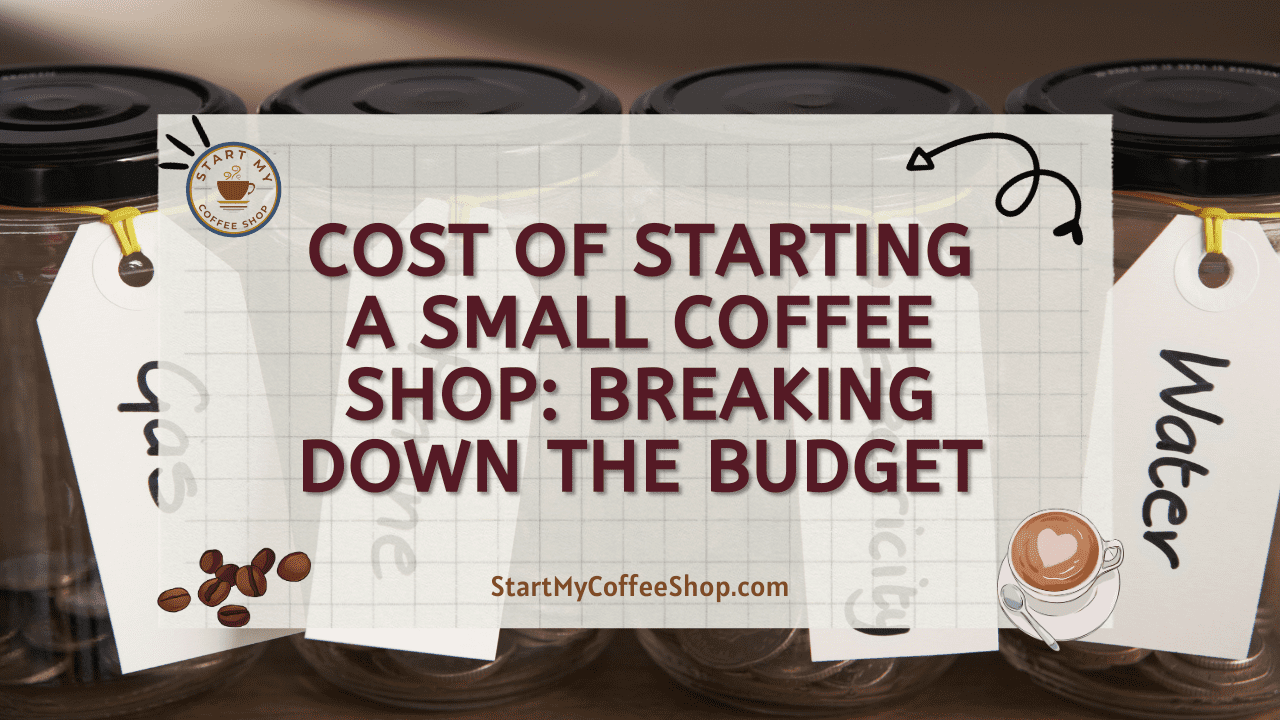Starting a small coffee shop can be an exciting venture for coffee enthusiasts and aspiring entrepreneurs. However, it’s crucial to have a clear understanding of the costs involved in establishing and running a coffee shop.
The cost of starting a small coffee shop can vary greatly depending on factors such as location, size, renovations, equipment, licenses, and staffing. On average, it can range from $80,000 to $250,000 or more. Careful budgeting and planning are essential for starting this kind of business.
In this article, I will explore the various expenses you can expect when starting a small coffee shop and provide you with valuable insights to help you plan your budget effectively.
Location and Lease Costs
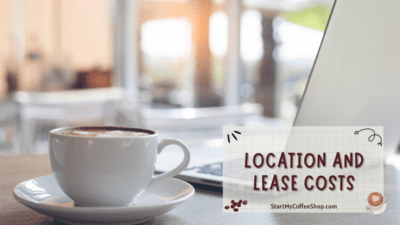
Selecting the ideal location for your coffee shop is of utmost importance. The expenses associated with leasing or buying a suitable space can fluctuate greatly, influenced by factors like the city, neighborhood, and size of the premises.
It is common knowledge that prime locations boasting high foot traffic typically come with a premium price tag. Striking a delicate equilibrium between visibility and affordability becomes crucial in such instances.
When it comes to choosing a location, consider the demographics of the area and the target market for your coffee shop. Is the neighborhood populated by students, professionals, or families?
Assessing the foot traffic, nearby businesses, and competition is vital for gauging the potential customer base and estimating revenue prospects. Furthermore, accessibility and parking availability should also be taken into account, as they can affect the convenience and attractiveness of your coffee shop to potential customers.
While a prominent location can attract more customers, the cost must align with your budget and financial projections. It’s prudent to conduct thorough research, analyze the rental or purchase prices in different areas, and weigh them against the potential customer flow.
Additionally, considering the long-term lease agreements or property ownership costs is essential for sustaining your coffee shop’s profitability in the future.
Read more about: Coffee Stand Start-up Costs: Counting the Cost
Renovation and Interior Design
Designing an appealing and visually captivating atmosphere holds immense significance in drawing customers to your coffee shop. The expenses associated with renovations and interior design encompass various elements, including flooring, lighting, seating, counters, kitchen equipment, and restrooms. Allocating a specific portion of your budget towards these costs is vital, while simultaneously considering the overall theme and ambiance you aim to establish.
When it comes to interior design, consider the overall concept and vibe you wish to convey to your customers. Are you aiming for a cozy and rustic feel, a modern and minimalistic approach, or perhaps a vibrant and eclectic atmosphere? Your design choices should align with your target audience and the overall branding of your coffee shop.
Flooring plays a significant role in setting the foundation for your coffee shop’s aesthetic. Options range from hardwood floors, tiles, or even polished concrete, each with its cost implications.
Lighting is another essential element that can greatly enhance the ambiance. Strategically placed lighting fixtures can create a warm and inviting atmosphere, while natural lighting can be harnessed to brighten up the space during the day.
Seating options should be comfortable and accommodating, allowing customers to relax and enjoy their coffee. Consider a mix of seating arrangements, including chairs, tables, bar stools, and cozy couches to cater to different preferences. Counters and display areas should be visually appealing and functional, showcasing your menu items and enticing customers to make a purchase.
Investing in quality kitchen equipment is crucial for ensuring efficient operations and maintaining consistent quality in your coffee and food offerings. Restrooms should be clean, well-maintained, and reflect the overall design aesthetic of your coffee shop.
Equipment and Furnishings
To deliver exceptional coffee and beverages, acquiring the right equipment is essential. This includes espresso machines, grinders, coffee brewers, refrigerators, blenders, and more.
These tools ensure that you have the necessary means to prepare and serve high-quality drinks to your customers. It’s important to invest in reliable and durable equipment that can withstand the demands of a bustling coffee shop environment.
Apart from coffee-specific machinery, you’ll also need furniture to create a comfortable and inviting seating area. Tables, chairs, and couches should be chosen with both functionality and aesthetics in mind.
Consider the overall layout and space utilization of your coffee shop to maximize seating capacity while maintaining a cozy ambiance. It’s worth exploring different styles and materials to find the right balance between durability, comfort, and visual appeal.
When sourcing equipment and furniture, thorough research is crucial. Look for reputable suppliers who offer quality products at reasonable prices. Comparing quotes and exploring different options can help you make informed decisions and potentially negotiate better deals. It’s also beneficial to consider warranties, maintenance services, and customer support offered by the suppliers.
Managing costs effectively is essential for the financial stability of your coffee shop. While it may be tempting to cut corners and opt for cheaper equipment or furniture, it’s important to strike a balance between quality and affordability. Investing in reliable and durable equipment may result in long-term cost savings by reducing maintenance and replacement expenses.
Licenses and Permits
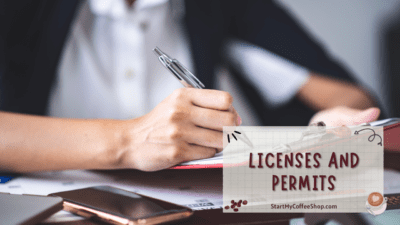
When running a coffee shop, it is essential to navigate the world of licenses and permits. These include obtaining a business license, health permits, food handling permits, and, potentially, liquor licenses if your establishment intends to serve alcoholic beverages.
The costs associated with these licenses and permits are not fixed and can vary significantly based on your location and local regulations. To ensure compliance, it is crucial to consult with local authorities and familiarize yourself with the specific requirements and associated fees.
Securing a business license is typically the first step in establishing your coffee shop. This license legitimizes your operation and ensures that you meet the necessary legal requirements. Health permits are vital to guarantee food safety and sanitation standards within your establishment. These permits may involve inspections and regular renewals.
Food handling permits are essential if you plan to serve prepared food items alongside your beverages. These permits confirm that you comply with local health and safety regulations when handling and serving food. If your coffee shop aims to offer alcoholic beverages, you may need to obtain a liquor license, which can involve additional costs and requirements.
To accurately estimate the expenses related to licenses and permits, it is crucial to research the specific regulations and fees in your area. Local government websites and agencies can provide comprehensive information about the necessary permits and associated costs. Additionally, consulting with professionals in the industry or local business associations may offer valuable insights and guidance.
Read more about: Coffee Stand Start-up Cost: Coffee Stand Kickoff
Inventory and Supplies
Operating a coffee shop requires diligent inventory management to ensure a steady supply of essential items. Your inventory will encompass a range of items, including coffee beans, tea, milk, syrups, sweeteners, disposable cups, lids, napkins, and other necessary supplies.
The cost of maintaining inventory will depend on various factors, such as your menu offerings, customer demand, and agreements with suppliers. Implementing efficient inventory management practices is crucial for minimizing waste and effectively controlling costs over time.
To determine your inventory needs, it’s essential to analyze your menu and forecast the quantities of each item required. Consider the popularity of different beverages and anticipate seasonal variations in demand. This information will enable you to establish appropriate reorder points and ensure you have sufficient stock to meet customer expectations.
Maintaining strong relationships with reliable suppliers is vital for securing favorable pricing and timely deliveries. Explore different suppliers and negotiate pricing agreements based on your projected volumes. Consider factors such as the quality of their products, their ability to meet your needs consistently, and their responsiveness to any supply issues or changes in demand.
Implementing inventory management techniques, such as utilizing a point-of-sale (POS) system or inventory tracking software, can streamline the process. These tools help monitor inventory levels, track sales and generate reorder alerts. Regularly reviewing inventory reports and conducting physical audits will help identify any discrepancies and allow for adjustments to ordering quantities.
Effective inventory management also involves minimizing waste and spoilage. Implementing proper storage practices, such as organizing and rotating stock, can prevent items from expiring or becoming unusable. Additionally, monitoring customer preferences and adjusting your inventory accordingly can help avoid excess stock of less popular items.
Staffing and Wages
Ensuring the progress of your coffee shop hinges on hiring and training a capable and personable team. Labor costs will encompass wages, payroll taxes, and potential benefits. It is crucial to allocate a budget for both front-of-house staffs, including baristas and servers, and back-of-house staff, such as kitchen assistants and cleaning personnel.
Conducting a thorough assessment of your staffing requirements and devising a fair compensation structure are vital steps in building a strong team. By investing in skilled and dedicated employees, you create an environment where customers feel welcomed and attended to, fostering loyalty and contributing to the overall performance of your coffee shop.
Marketing and Advertising
Effectively promoting your coffee shop is essential to attract customers and cultivating a loyal clientele. Marketing and advertising expenses encompass various elements, such as creating a visually appealing website, designing a captivating logo and branding materials, and investing in social media advertising, online listings, print materials, and local promotions.
Allocating a dedicated portion of your budget to marketing efforts is vital in raising awareness and driving foot traffic to your establishment. By strategically showcasing your coffee shop’s unique offerings, ambiance, and values, you can effectively reach your target audience, build brand recognition, and ultimately increase customer engagement and loyalty.
A well-executed marketing strategy not only enhances your coffee shop’s visibility but also positions it as a go-to destination for coffee enthusiasts, thereby fostering growth.
Utilities and Overhead Costs
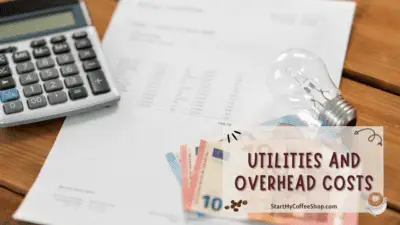
In addition to the initial startup costs, it is crucial to consider the recurring expenses that come with operating a coffee shop. These ongoing expenses include electricity, water, heating/cooling, internet connectivity, waste management, and insurance.
The exact amount you will spend on these utilities will depend on factors such as the size of your coffee shop and its location. It is wise to conduct thorough research to find utility providers offering competitive rates in your area.
By actively managing these recurring expenses and seeking cost-effective solutions, you can ensure the smooth operation of your coffee shop while keeping your overhead costs in check. Proper budgeting and periodic evaluation of these expenses will contribute to the financial stability and long-term growth of your coffee shop.
Read more about: Coffee Shop Startup Costs Spreadsheet: A Barista’s Balance Sheet
Summary
Starting a small coffee shop involves various costs that need to be carefully considered and planned for. By thoroughly analyzing each aspect of the budget, from location and renovations to equipment, licensing, staffing, and marketing, you can create a realistic financial plan for your venture. Remember, effective financial management and providing a quality coffee experience to your customers will greatly increase your chances of improvement in the competitive coffee shop industry.
Frequently Asked Questions
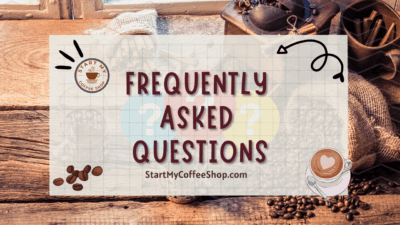
Q: Do I need prior experience in the coffee industry to start a coffee shop?
A: While prior experience in the coffee industry can be beneficial, it is not a strict requirement.
Q: What are the ongoing expenses of running a coffee shop?
A: Ongoing expenses of running a coffee shop include rent or mortgage payments, utilities, inventory and supplies, employee wages, marketing and advertising costs, maintenance and repairs, licensing fees, and insurance premiums.
Q: Are there any financing options available for starting a coffee shop?
A: Yes. These can include traditional bank loans, Small Business Administration (SBA) loans, crowdfunding, personal savings, partnerships, or seeking investors.
To learn more on how to start your own coffee shop, check out my startup documents here.
Disclaimer: The information provided by StartMyCoffeeShop.com (“The Site”) is for general informational purposes only. All information on the Site is provided in good faith. However, we make no representation or warranty of any kind, express or implied, regarding the accuracy, adequacy, validity, reliability, availability, or completeness of any information on the Site. Under no circumstance shall we have any liability to you for any loss or damage of any kind incurred as a result of the use of the Site or Reliance on any information provided on the Site. Your use of the Site and reliance on any information on the Site is solely at your own risk. This blog post is for educational purposes only and does not constitute legal advice. Please consult a legal expert to address your specific needs. Terms and Conditions. (https://startmycoffeeshop.com/terms-and-conditions/)

Hi! I’m Shawn Chun
My adventure in coffee began when I first launched my first coffee shop back in the early 2000s. I had to figure out so many things on my own and to make it worse within 2 years of opening two large corporate coffee chains moved in just blocks away from me!
As I saw smaller and even some larger coffee shops in the neighborhood slowly lose customers to these giant coffee chains and slowly close up shop, I knew that I had to start getting creative…or go out of business.
I (like you may be) knew the coffee industry well. I could make the best latte art around and the foam on my caps was the fluffiest you have ever seen. I even had the best state-of-the-art 2 group digital Nuova Simonelli machine money could buy. But I knew that these things alone would not be enough to lure customers away from the name brand established coffee shops.
Eventually, through lots of trial and error as well as perseverance and creativity I did find a way to not only survive but also thrive in the coffee/espresso industry even while those corporate coffee chains stayed put. During those years I learned to adapt and always faced new challenges. It was not always easy, however, in the end, I was the sole survivor independent coffee shop within a 10-mile radius of my location. Just two corporate coffee chains and I were left after that year. All told the corporate coffee chains took down over 15 small independent coffee shops and kiosks and I was the last one standing and thriving.
Along the years I meet others with the same passion for coffee and I quickly learned that it is not only “how good a barista is” that makes a coffee shop successful, but the business side of coffee as well.
Hence why I started this website you are on now. To provide the tools and resources for up and coming coffee shop owners to gain that vital insight and knowledge on how to start a coffee shop successfully.
Stick around, browse through my helpful blog and resources and enjoy your stay! With lots of LATTE LOVE!
Shawn

